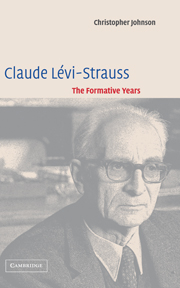Book contents
Conclusion: The will to coherence
Published online by Cambridge University Press: 05 June 2012
Summary
Tout classement est supérieur au chaos.
(Any classification is superior to chaos.)‘Surviving Lévi-Strauss’. This was the title of the contribution by the French anthropologist Jean Guiart to a special issue of the journal L'Arc, dedicated to Lévi-Strauss in 1968. If one were to speak of the legacy of Lévi-Strauss's work, one that is distributed across the spectrum of contemporary thought, then it is necessary to remember that this legacy weighs the most heavily in the discipline and in the country that were its instance of origination. Already, in 1968, Guiart credits Lévi-Strauss with having transformed French anthropology, presiding over its expansion into new geographical areas and giving it a truly international profile. However, Guiart also sees this strength as a potential weakness, to the extent that Lévi-Strauss is the only figure of such stature in French anthropology. His disappearance would leave the discipline in the same state of disarray in which he had found it earlier in the century. Will France have only one Lévi-Strauss? he asks. Almost twenty years later, in a special issue of L'Homme, on the state of French anthropology, a similar observation is made by anthropologist Pierre Smith: Lévi-Strauss's contribution ‘has not been replaced by anything more satisfactory or more coherent. One can't get around this legacy without giving the impression that French anthropology has given up on the idea of a common programme, one that has never been formulated in a more reasoned and more complete manner’.
- Type
- Chapter
- Information
- Claude Lévi-StraussThe Formative Years, pp. 180 - 191Publisher: Cambridge University PressPrint publication year: 2003



